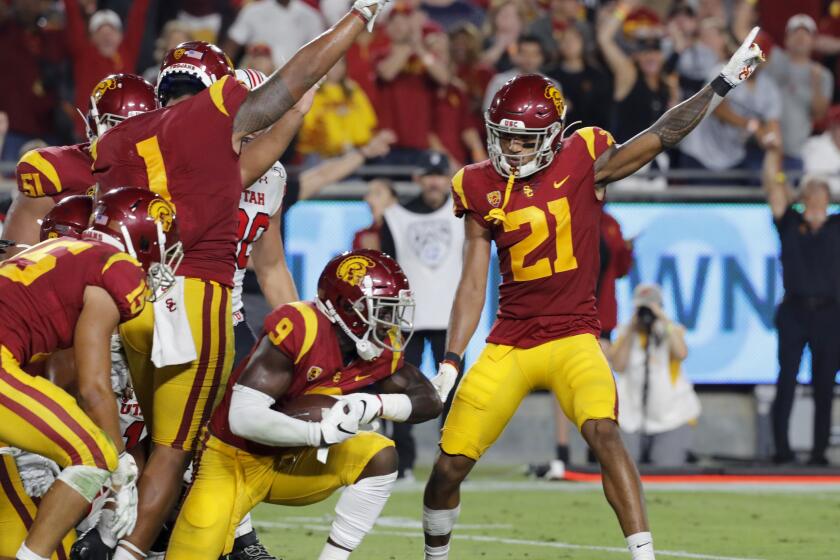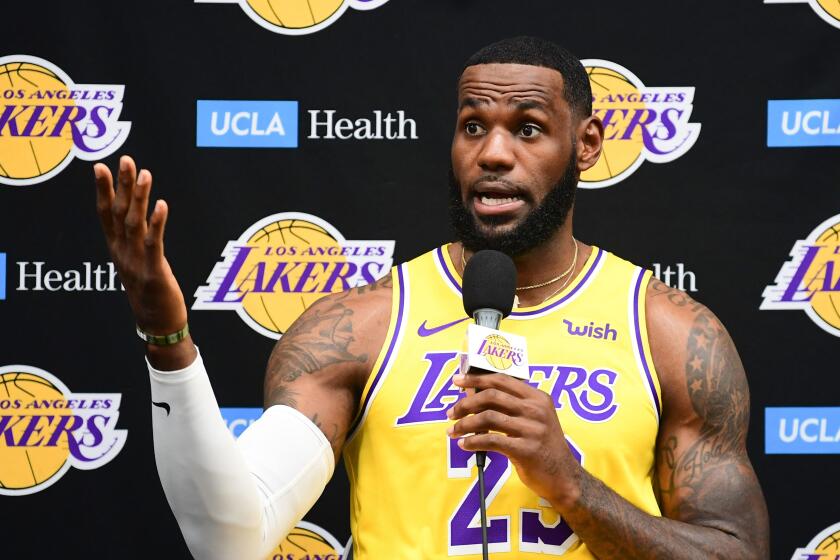Students, parents ponder a future where college athletes can market themselves for money
- Share via
for There was no school on Monday at Studio City Harvard-Westlake because of Rosh Hashanah, so 14-year-old freshman baseball player Kai Caranto was at home, trying to catch up on homework from missing three weeks of classes. He’d been busy earning a gold medal playing for the USA 15-and-under national team.
There’s an expectation he will be a top college and professional prospect by the time he graduates in 2023, the year a new California law is scheduled to take effect allowing college athletes to earn money from the use of their names, images and likenesses.
With the news that Gov. Newsom had signed Senate Bill 206, Caranto was asked for his reaction: Would being allowed to earn money as a college athlete make him less likely to sign a pro contract out of high school?
“I haven’t really thought about that because it’s a long ways to go,” he said. “College is real important, but MLB is a great opportunity if I have that chance.”
Gov. Gavin Newsom has signed a high-profile bill that would allow college athletes to earn money, despite NCAA objections.
Boys and girls who are freshmen or in 10th grade and on their way to becoming elite athletes could have new opportunities to market themselves by 2023 under the legislation. At a minimum, it’s going to cause them and their parents to investigate what a new world in college sports might look like. Athletes at California schools would be allowed to be paid to attend a camp, endorse a local car dealership or charge for signing an autograph.
Jerome Stanley, an agent for basketball and football players, is also the father of Duke freshman basketball player Cassius Stanley, who led Chatsworth Sierra Canyon High to a state championship last season. He said if the law had been in effect this year outside of California, his son probably would be one of the first individuals to market himself to a variety of entities.
“Only the elite of the elite have a market,” he said. “Cassius has a half-million Instagram followers. That’s the guy who would have a number of companies come in and say, ‘Can you document your journey and we’ll pay you $50,000.’ ”
By 2023, Stanley said he expected athletes to be paid for wearing street shirts, playing video games or having their faces on billboards.
In basketball, top high school players who are entertaining dunkers are already employing social media as a marketing tool to build followers on Twitter, Instagram and YouTube while preparing for the day they could use their popularity to earn money through shoe or endorsement deals.
Sophomore Amari Bailey, a sophomore on the Sierra Canyon boys’ basketball team, has more than 74,000 Instagram followers. He said his mother reminds him to post videos of him being a kid and hopes that it lets people see his playful goofiness along with his great basketball skills that might help build a loyal fan base.
“You can go on the page and find a video of me dancing last year,” he said. “I’m showing people who I am. That will speak for itself. If people don’t know who I am, they won’t want to pay someone X amount of dollars.”
Ella Parker, a 14-year-old freshman softball player at Sherman Oaks Notre Dame High, is the No. 3 college prospect for the class of 2023. She could be in a position to be an influencer. Her uncle is Dodgers manager Dave Roberts.
“I say it’s a good idea to be paid,” she said, “because for women’s sports, especially softball, you don’t get a lot of money.”
Gov. Gavin Newsom has signed a high-profile bill that would allow college athletes to earn money, despite NCAA objections.
She has an Instagram account with a little over 1,000 followers, and success over the next four years in high school could put her in position to be one of the new college athletes to be rewarded for her marketability.
“That would be cool to be able to influence,” she said.
Brian Jacobs, a former UCLA football player, has a 15-year-old son, Jack, who’s a 6-foot-5 freshman quarterback at La Canada St. Francis High. He is concerned that the growing focus on money in college sports will affect what the college experience is supposed to be about — education.
“The first thing to come to mind is, I worry [about] further skewing the balance of college football,” he said. “There’s some parents and kids who will follow the money [even more]. I daydream, is there a system kids can have money put aside in a trust they can have after school? I tell my kids I have 20 or 30 friends that make money professional athletes make and they do it with their brains. I worry it’s another reason to take their eyes off education.”
Lakers star LeBron James believes California’s NCAA reform bill, which was signed by Gov. Gavin Newsom on Monday, will bring “historical change in time.”
Stanley believes the NCAA will have to change its rules because other states will follow California’s lead. NCAA rules strictly prohibit student athletes from directly profiting in any way from their sports.
“Finally someone of power has drawn a line in the sand,” Stanley said. “The only people in the past have been former students who were underfunded and no longer relevant in the discussion. Now you’re taking on the state of California. The NCAA is going to need to go back and figure out a model that makes the California law moot. Because California law will start to be enacted by other states.”
Caranto said he would talk to his parents if the time came when he had the opportunity to decide between college and the pros.
“If baseball doesn’t work out, you still have education to support you,” he said. “It would be a big decision for sure.”
This week, though, instead of worrying about bonus money or dreaming up a YouTube channel to earn money, Caranto has a more pressing priority.
“I’m just trying to compete against all these great players in our league and earn a spot on varsity,” he said.
More to Read
Get our high school sports newsletter
Prep Rally is devoted to the SoCal high school sports experience, bringing you scores, stories and a behind-the-scenes look at what makes prep sports so popular.
You may occasionally receive promotional content from the Los Angeles Times.









